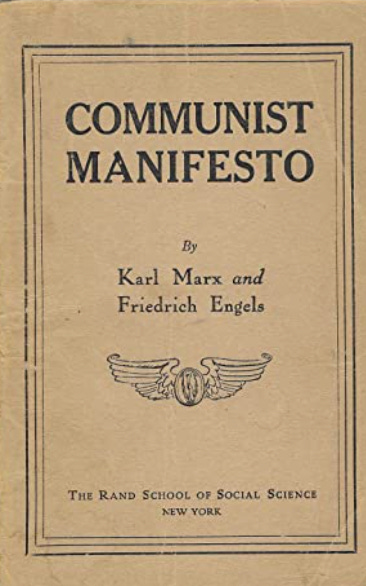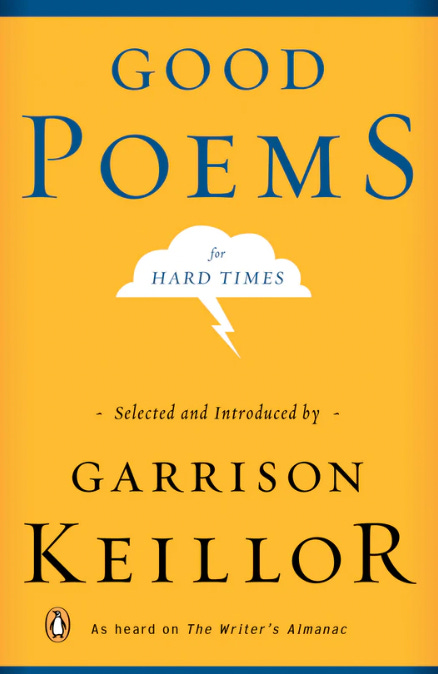VIII – from “Twelve Songs” by W. H. Auden from Collected Poems. © Modern Library, 2007.
ORIGINAL TEXT AND AUDIO - 2017
The most influential and best-selling political pamphlet of all time was first published on this day in 1848: The Communist Manifesto, written by Marx and Engels.
Marx and Engels wrote the Manifesto as a call to action aimed at proletariat across Western Europe, and as an advertisement or plug for a specific type of socialism — the version Marx and his colleagues and the Communist League promoted. There were a lot of versions of socialism already circulating around Europe.
Most of the ideas that went into The Communist Manifesto were brainstormed over the course of a week and a half in a room above an English pub — a pub called the Red Lion, located in the Soho district of London.
It’s the birthday of writer Ha Jin, born in Liaoning Province in China (1956). He was a bright student, chosen to attend a competitive school away from home. But after a couple of years, his family could no longer afford to send him there, and then the Cultural Revolution broke out. He said, “We had nothing to study in school, so we played on the streets or went into mountains to pick up peanuts and sweet potatoes left by the peasants in the fields.” He went into the army, and he practiced reading with propaganda material and Communist books.
He went on to graduate school in the United States, and then he stayed there, and started writing poetry, short stories, and novels. His many books include Under the Red Flag (1997), Waiting (1999), and most recently, The Boat Rocker (2016).
It’s the birthday of David Foster Wallace, born in Ithaca, New York (1962). He wrote Infinite Jest (1996), which was 1,079 pages long with 388 footnotes. It was dense and intellectual, a futurist novel about addiction, tennis, and separatist groups, among many other subjects. But it was a best-seller, and it propelled Wallace into the literary spotlight.
He said: “Postmodern irony and cynicism’s become an end in itself, a measure of hip sophistication and literary savvy. Few artists dare to try to talk about ways of working toward redeeming what’s wrong, because they’ll look sentimental and naive to all the weary ironists. Irony’s gone from liberating to enslaving. … The postmodern founders’ patricidal work was great, but patricide produces orphans, and no amount of revelry can make up for the fact that writers my age have been literary orphans throughout our formative years.”
It’s the birthday of English poet W.H. Auden (1907), who once said, “A poet is, before anything else, a person who is passionately in love with language.” Auden published around 400 poems in his lifetime, including haikus, villanelles, ballads, sonnets, and limericks.
T.S. Eliot is quite at a loss
When clubwomen bustle across
At literary teas
Crying, “What, if you please,
Did you mean by The Mill On the Floss?”
One of his most famous poems is “September 1, 1939,” written in a bar in New York City on the eve of World War II. The poem became very famous for the line “We must love one another or die,” but Auden disliked the line and the poem; he tinkered with both throughout his life, finally disavowing the poem entirely. He said it was “infected with an incurable dishonesty.”
In 1939, Auden was sailing to New York with his friend, writer Christopher Isherwood. They had known each other since they were eight years old and both attending boarding school at St. Edmund’s.
Auden landed at a somewhat shabby, funny-looking brownstone in Brooklyn Heights with other writers like Carson McCullers and Benjamin Britten. They called it the “February House” and it became a notorious haven for intellectuals, bohemians, and hangers-on, though Auden was very fussy about everyone’s writing time and instituted regular working hours before debauchery was allowed to start. He even made sure everyone had a good dinner every night, delighting in announcing, “We’ve got a roast and two veg, salad and savory, and there will be no political discussion.” Even striptease artist Gypsy Rose Lee lived in the house for a time. She paid a good rent for her room in exchange for writing lessons. She began her book The G-String Murders (1941) at February House. And after a conversation with Auden, Carson McCullers started the book that would become The Ballad of the Sad Café (1951). Sometimes things got a little crazy: one boozy evening the writers raided the icebox and mistakenly ate cat food. Auden’s housemates called him “Uncle Wiz.”
W.H. Auden spent half of his 66 years living in New York City. He once said, “I adore new York, as it is the only city in which I can live and work quietly.” Auden won the Pulitzer Prize for Poetry for his collection The Age]of Anxiety (1948). His books include Letters from Iceland (1937), The Sea and the Mirror (1958), and Thank You, Fog (1974).
Be well, do good work, and keep in touch.®
Good Poems for Hard Times






I thought you would want to know, Garrison, the the word 'haiku' is both singular and plural. You would write:
Auden published around 400 poems in his lifetime, including haiku, villanelles, ballads, sonnets, and limericks.
"and there will be no political discussion at all".....yep, save that discussion for another time and only if necessary